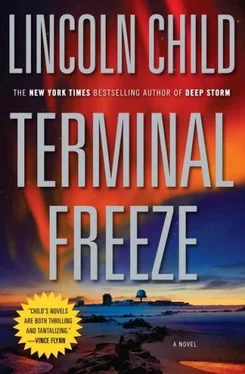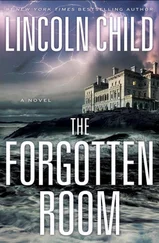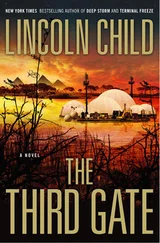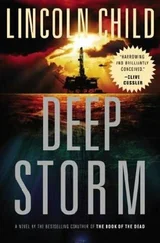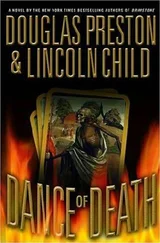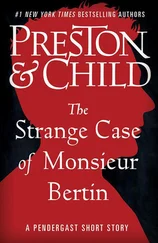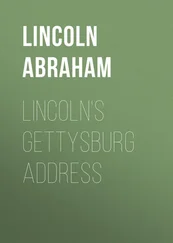He nodded tersely. “All right.”
Wolff led the way through the doorway into the examining room beyond. There was a plain wooden chair, a sink, a bench containing towels and two military-issue portable medical kits, and several cabinets full of supplies both old and new. Dominating the room was an examining table, fully reclined, on which lay a sheeted figure. The sheet was slick with blood, and rolled towels had been placed around it, like sandbags along a levee, to stanch additional flow.
Marshall swallowed. He had dissected bodies in graduate-level physiology courses. But those bodies had been sanitized: drained, cleaned, anonymous, seemingly more synthetic than human. Josh Peters was none of those things.
He glanced at the others who had silently arranged themselves around the table. Wolff, his expression studiously neutral. Gonzalez, staring at the bloody sheet, jaw working. Sully, looking more uncomfortable than ever. And Conti, eyes darting toward the body, then away, and then back again, with the strangest mix of agitation, hunger, and impatience on his face.
“I’ll need a couple of buckets and a sponge,” Marshall said.
Gonzalez disappeared into a storage closet, returned with two white plastic tubs. Marshall placed one on the floor beside the table, half filled the other with water from the sink. A dusty lab coat hung from a peg on the door and Marshall put it on. Opening one of the portable medical kits, he pulled out a pair of latex gloves, snapped them over his hands. Then he turned toward Sully.
“Gerry?” he said.
Sully didn’t answer. He was looking at the rolled towel pressed against Peters’s sheeted head. It was so sodden that blood was dripping from it onto the floor.
“Gerry,” Marshall said a little more loudly.
Sully started, looked at him.
“Would you mind taking notes?”
“Huh? Oh. Sure.” And Sully searched his pockets for a pen and a bit of paper.
Marshall took a deep breath. Then he reached for the rolled towels on the near side of the corpse and dropped them into the tub. They made a wet slapping noise as they hit the plastic. Another, deeper breath. Then, grasping the edge of the sheet, he slowly peeled it away from the body.
A collective, involuntary groan issued from the observers. Marshall heard it rise in his own throat. The only person who remained silent was Gonzalez, whose jaw nevertheless worked more quickly.
It was even worse than he’d feared. Peters looked like he’d been through a thresher. His clothes were in tatters and there were cuts over almost all the exposed surfaces of his body, thin straight red lines razored through the pale flesh. There was a huge, vertical slashing wound across his chest, tearing it open, the lower ribs sprung and gaping, ends clean and bare as if a butcher had frenched them. The slash widened as it reached the abdominal region, exposing red-and-gray ropes of viscera. More horrifying was the trauma to the head, an attack that left it barely recognizable: a ruined, broken skull sagging flaccidly from the brain stem, gray matter leaking into the crushed remains of the sinus cavities.
Marshall turned away, blinked several times. Then he took half a dozen of the clean towels from the bench, rolled them tightly, and snugged them up against the body to stop the blood that still trickled from a hundred cuts. Reaching into the medical kit, he removed a metal probe. Then he turned his attention back to Peters.
“The body seems to be completely exsanguinated,” he said. “There appear to be excoriations over almost its entire surface, along with numerous, perhaps hundreds, of narrow wounds with non-ragged margins. I am at a loss to explain how these smaller wounds were created. At least two of the other, larger wounds present could individually have proven fatal. The first of these fractured and exposed the-let’s see-the eighth to the twelfth ribs on the left side, penetrating the pleura and causing massive hemorrhaging, then continued down to the abdominal area where it also penetrated the peritoneal cavity. In the wound channel there are indications of damage to the cardiac ventricles. The second large wound needs little description. Massive damage to the entire region of the neck and head, from the right internal jugular vein to the cerebrum to the parietal lobe to the frontal lobe, along both sides of the longitudinal fissure. Elsewhere, the patella and other bones of the left knee are crushed, the femoral artery pierced.” A pause. “Damage to the clothing corresponds to the injuries noted. Further analysis will have to await toxicological and professional forensic analysis.” He stepped away.
For a moment, nobody spoke. Then Gonzalez cleared his throat. “It’s like I said. A polar bear attack. Now, can we get him wrapped up and stowed in a meat locker?”
“It could be human,” Wolff replied. His voice was quiet but steady.
“Are you crazy?” Gonzalez said. “Look at the wounds!”
“People high on certain illegal drugs have been known to fall into ferocious, murderous rages. With the right kind of implement-weapon-this kind of damage could be inflicted.” He turned to Marshall. “Isn’t that right?”
Marshall glanced back at the body. “The chest wound is about ten centimeters wide, with a total depth of almost eight centimeters. The amount of pressure to inflict such a wound would be massive, requiring tremendous strength.”
“Such as a polar bear,” said Gonzalez.
“Frankly, I’m surprised even a polar bear could create wounds like that,” Marshall replied.
“A killer could do it,” said Wolff. “If given time to land enough blows.”
“What about this, then?” With the probe, Marshall lifted the left leg at the knee. The foot swung loosely-too loosely-and hung at an odd angle. “It’s bitten almost completely through, hanging by a few tendons.”
“Simulated bite marks,” Wolff replied. “Created to cause fear and unease.”
“For what purpose?” asked Sully.
“To keep the curious away from the site where the cat’s body has been cached.”
Marshall sighed. “So you’re telling us that whoever stole the cat is willing to kill-kill in the most outrageous and savage fashion imaginable-to protect his prize?”
“He or she was willing to come up here, pretend to be one of us,” Wolff countered. “Willing to spend the time and the money, take a terrible risk. Why not?”
Marshall looked speculatively at him. “I don’t see why you refuse to accept the far simpler, far more rational explanation: this man blundered into the path of a polar bear and got killed as a result. Polar bears are ferocious, known man-killers. Why can’t you believe that?”
Wolff’s eyes glinted in the harsh artificial light. “Dr. Marshall, you speak of simple, rational explanations. I can’t accept that a polar bear did this for one very simple, very rational reason: if there is no thief-if a polar bear did this-then where did the cat go…and why is it missing?”
Throughout the meeting in the infirmary, Conti had remained silent, preferring to keep his observations to himself. As the group broke up, he stayed behind for a moment, watching Gonzalez and the newly returned Private Phillips carefully wrap the body in preparation for storage. From the soldiers’ chatter he’d learned that, in order to isolate the corpse from the rest of the personnel, a spare meat locker in the south wing would be used. Now he began making his way slowly and thoughtfully back to the central section of the base.
As he reached the entrance plaza, he saw Fortnum and Toussaint approaching.
“Emilio,” Fortnum said. “We heard you wanted to see us?”
Conti glanced around quickly before answering. The plaza was empty, the guard station temporarily unattended. Conti lowered his voice anyway.
Читать дальше
